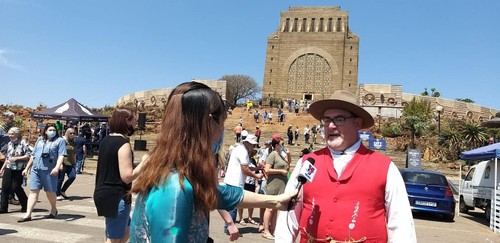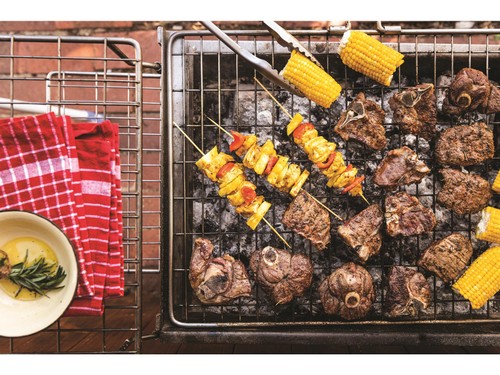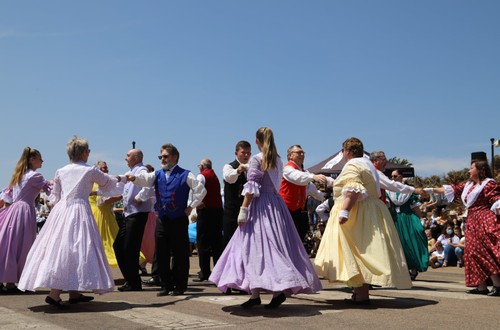 Prof Anton at 2021 Heritage Day at the Voortrekker Monument (Photo: Hong Minh/VNA) Prof Anton at 2021 Heritage Day at the Voortrekker Monument (Photo: Hong Minh/VNA) |
Anton van Vollenhoven: Good day, listeners. It’s very nice to be talking to you and I hope you’ll enjoy what I’m going to tell you. I’m Professor Anton van Vollenhoven from South Africa. I’m a historian and archaeologist working at North-West University.
Bao Tram: South African people celebrate Heritage Day on September 24. Could you tell us more about the celebration?
Anton van Vollenhoven: Heritage Day is a South African holiday which we celebrate on September 24th every year. It was the birthday of King Shaka who was a King in the Zulu culture. We have many different cultures in South Africa. When we became a democracy, we took different things from different traditions and made them different holidays. In this case, Heritage Day comes from the Zulu Culture.
Bao Tram: Some of my friends told me that Heritage Day is usually celebrated with a cookout known as a braai. What is braai specifically?
Anton van Vollenhoven: That’s a Zulu word. It actually comes from my culture of African speaking people. Braai is a way of preparing food over an open fire and it’s something very typical of African speaking people. They started to call it Braai Day because a braai day is a nice day. It’s a day in the spring when the weather is nice. But to be honest, braai has become a pan-African tradition although it came from African speaking people. Everybody knows the word braai is an African word but all other languages also use it. A braai is very typical of African culture.
 Braaiing is a shared social custom that is enjoyed by all South Africans. (Photo: jozistyle.joburg) Braaiing is a shared social custom that is enjoyed by all South Africans. (Photo: jozistyle.joburg) |
Bao Tram: So Heritage Day or Braai Day is a day when family and friends gather to chat and eat. What foods do South Africans usually eat on Heritage Day? You must have a variety of foods for the celebration?
Anton van Vollenhoven: Of course, different groups might eat different things, but usually when we have braai, that means red meat, which is preferred to other meat. Sometimes we’ll prepare some bread with that, but it’s bread made on an open fire. There’s another dish we call pap. It’s a kind of porridge. But it’s not the kind of porridge you eat for breakfast. It’s a braai porridge, which you cook in a pot put on the fire. There’s a very nice sauce we call sheba, made from tomatoes and onions, plus some other things to make it tasty. You can add various vegetables, but those vegetables are also grilled over the fire.
 (Photo: Hong Minh/VNA) (Photo: Hong Minh/VNA) |
Bao Tram: What are the highlights of Heritage Day? What do South Africans usually do on that day?
Anton van Vollenhoven: Most heritage sites in the country probably have specific events on that day, where people can come together and enjoy that heritage site or that museum. But they will add something. It won’t be just going through the museum looking at the displays. They’ll add something like a flea market where people sell food, clothing, handicrafts, and so on. People can enjoy that, and usually there will be groups playing music to make the day more enjoyable for everyone.
Bao Tram: From what you’ve said, I get the idea that Heritage Day or Braai Day is a day to gather around a fire, wave the flag, and celebrate the nation’s heritage. But this year is different because of the pandemic. How has that affected Heritage Day?
Anton van Vollenhoven: It was quite a challenge this year. Luckily, Heritage Day came when we were on a level 2 lockdown, which meant families, at least, could get together. So people who wanted to braai could get together to braai. What the people did who gathered at the monument, which is a very large site, what they did was they had four or five different…let's call them functions. They exceeded the number of people allowed (I can't remember the exact number now), but they split up into different functions. So on a very large site you might have had 2 to 4 thousand people, but they split into 5 or 6 or 7 different functions. I don’t want to say ‘activities’ because each function had lots of activities. For instance, at the foot of the monument, they had an antique fair, so people who liked antiques would have been at the antique fair. They also had a food festival. So some people would have gone to the food festival. They also would have had an education festival, so some people would have been at that one. That was how they split up the people to avoid exceeding the crowd size limit. This year we were lucky.
Bao Tram: Thank you, Professor Anton, for joining us today and introducing South Africa’s Heritage Day or Braai Day.
Anton van Vollenhoven: Goodbye to all you listeners. It was very nice joining you, and I hope we’ll find more occasions to speak to each other.